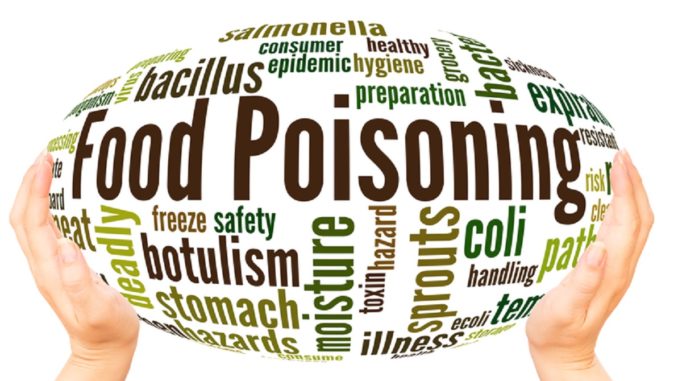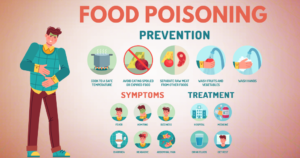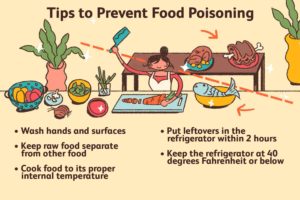
Table of Contents
What is Food Poisoning?
- Food poisoning simply means the illness caused by the consumption of food.
- Food poisoning is a type of food borne illness that people get from something that they ate or drank.
- This poisoning caused by food is brought on by consuming contaminated food.
- In these cases the food is generally contaminated with bacteria, such as salmonella or Escherichia coli (E. coli), or a virus, such as the Noro virus.
- Most people recover without medication in a few days and it’s often not serious.
- Poisoning can occasionally be brought on by the toxins these organisms produce.
Causes
- Eating food contaminated with certain bacteria or viruses is the main cause of food poisoning.
- When people consume these foods, the bacteria in digestive system keeps expanding which brings up an infection.
- Foods that contain a toxin or poison created by bacteria living in the food can also potentially cause disease
- There are several kinds of bacteria that can contaminate food. Ones of the more prevalent bacteria are: Salmonella and Campylobacter, Clostridium perfringens, Listeria, Staphylococcus aureus, Escherichia coli (E. coli)
- Foods can also be contaminated by:
- Not cooking properly (particularly meat)
- Leaving cooked food out of the refrigerator for an extended length of time.
- Improperly storing food that has to be cooled at or below 5C.
- Consuming food that has been in contact with a sick person or someone who has had vomiting and diarrhea
- Cross-contamination (where hazardous microorganisms are transmitted across food, surfaces and equipment)
Symptoms
The symptoms of food poisoning are usually present includes:
- Stomach pains
- Diarrhea
- Nausea
- Vomiting
- Reduced appetite
- Low fever and weakness
- Headache
- Stomach cramps
Rarely, but sometimes, food poisoning affects the nervous system and can cause severe disease:
- Blurred or double vision
- Loss of movement in limbs
- Swallowing problems
- Weakness
- Numbness or tingling of skin
- Changes in voice
Symptoms that might be fatal include:
- A temperature of more than 102°F (38.9°C) with persistent diarrhea that lasts longer than three days
- Signs of extreme dehydration, which can include dry mouth, passing little to no urine, trouble keeping fluids down, and bloody urine, include difficulties seeing or speaking.
Common Sources of Food Poisoning
- Raw and cooked meat, including chicken and minced meat, and foods containing them, such as casseroles, curries, and lasagne;
- Dairy products, including custard and dairy-based desserts like cheesecake and custard tarts
- Seafood, including seafood salad, patties, fish balls, and stews with seafood and fish stock;
- Eggs and egg products, including quiche;
- Cooked rice and pasta, dishes that are ready to eat like pizza, buns, and sandwiches
Risk Factors
- Food poisoning may affect anyone. But some people are at a higher risk of contracting it than others.
- If immune system is weak than average, susceptibility to contract poisoning or reaction to poisonous food increases.
- Additionally, they are more likely to become critically ill from it. This is a result of a malfunctioning immune system, which is the body’s defense against disease.
- People who are more vulnerable include:
- Young ones: They still don’t have completely mature immune systems.
- Older people: Their immune systems are less effective. It is also simpler to unintentionally consume tainted food due to changes in our perceptions of taste and smell brought on by aging.
- Pregnant mothers: During pregnancy, a woman’s immune system changes. The unborn child is also in danger.
- People with chronic (long-term) illnesses: The immune systems of those who suffer from conditions like diabetes or cancer are weakened.
Duration of Food Poisoning
- The symptoms of food poisoning may persist a few hours or several days.
- The type of contaminating bacteria determines how long poisoning lasts.
- It typically manifests itself a few hours after consuming contaminated food.
Complications
- Dehydration
- Systemic disease such as blood clots in kidneys or bacteria in blood streams,
- Pregnancy complications such as miscarriage, meningitis and sepsis
- Rare complications includes as arthritis, Irritable bowel syndrome, Guillain-Barre syndrome, breathing difficulties
Foods to Avoid During Food Poisoning
- Prior to recovering from food poisoning, it’s essential to replace any lost fluids from body.
- The easiest approach to achieve this is to consume fluids that have electrolytes in them.
- Return gradually to a regular diet. It may take a week or more for the digestive tract to fully heal, and appetite and digestion may not return to normal.
- It will be simpler to absorb carbohydrates during the early stages of recovery.
- After experiencing poisoning, stay away from hot or acidic meals, coffee, and alcohol. Foods with a lot of fiber, protein, or lipids may also be difficult to digest.
Preventive Measures of Food Poisoning
- Select safely processed foods
- Prepare food thoroughly
- Eat cooked items right away
- Store cooked foods with care
- Reheat prepared foods completely
- Avoid mixing raw and cooked meals together.
- Hand washing repeatedly
- Clean all kitchen surfaces thoroughly
- Foods should be kept free of pests, rats, and other animals.
- Use clean water
Food Safety Measures
- Cook: Make sure to give the food enough time and cook at the right temperature to destroy any germs that can cause gastroenteritis. A thermometer is useful for checking cooked meat and making sure egg yolks are firm.
- Separate: Separate foods, especially raw meat, to prevent cross-contamination.
- Chill: Cold storage inhibits the development of dangerous microorganisms.
- Cleanliness: Keep kitchen surfaces and utensils spotless. Wash hands often, especially before and after touching mouth or handling raw meat or eggs.
References and For More Information
https://www.fda.gov/consumers/free-publications-women/food-safety-home
https://www.paho.org/en/health-emergencies/who-golden-rules-safe-food-preparation
https://www.who.int/news-room/fact-sheets/detail/food-safety
https://www.fao.org/fao-stories/article/en/c/1194118/
https://www.mayoclinic.org/diseases-conditions/food-poisoning/symptoms-causes/syc-20356230
https://www.hopkinsmedicine.org/health/conditions-and-diseases/food-poisoning
https://www.betterhealth.vic.gov.au/health/healthyliving/food-poisoning-preventions

